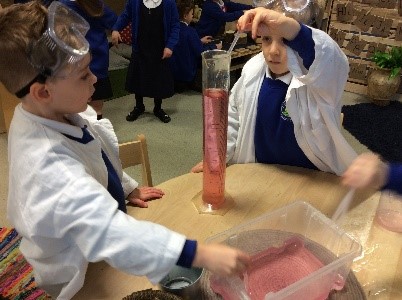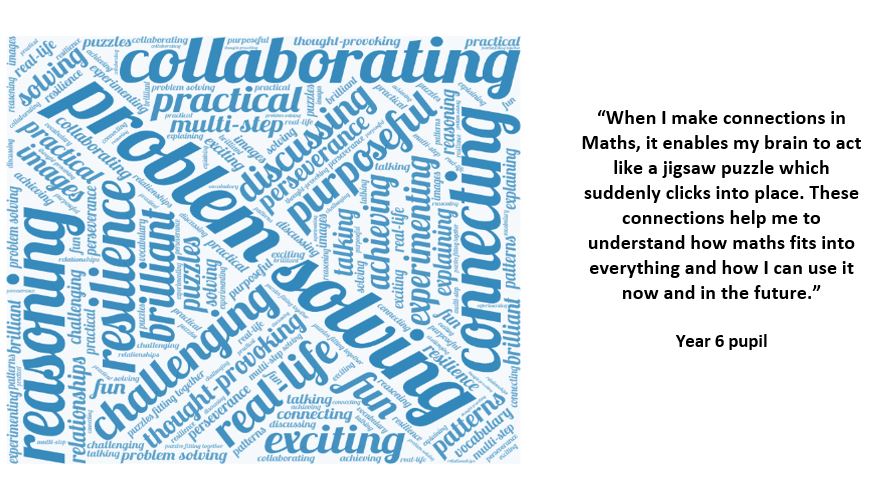Learning Intention
At Meadowbank Primary School we intend for our children to see Mathematics as purposeful and relevant to real life. We want them to understand how developing successful maths knowledge and skills will enable them to flourish in the real world and will provide them with a lasting legacy of vital skills for life. Alongside this, we want our children to feel they are successful at Maths and are able to explore and apply their skills across a range of topics and subjects. We intend that our children question and challenge themselves and others, pushing further to explore patterns, problems and relationships, showing resilience and resourcefulness when an answer isn’t easily or instantly found. Finally, we intend to empower our children to have high aspirations for themselves, to embrace the challenge and rich opportunities they are given, to enable them to flourish and become lifelong learners of mathematics.
Aims
- Motivate and excite children by the choice of mathematical opportunities.
- Enable children to be imaginative and creative, tackling new experiences and learning from them.
- Support children to investigate and solve problems thoughtfully when responding to key questions posed.
- Encourage learners to explore their own ideas and questions and be able to communicate using appropriate mathematical vocabulary when they are giving explanations.
- Enable learners to be able to reason and think logically.
- Encourage children to think carefully about how to solve a calculation, choosing an appropriate method whether it is mental or written.
- To encourage children to make decisions and work independently and to know that getting something wrong is part of the learning journey.
- To develop children’s Oracy skills so they can give clear explanations about what they have learnt.
- Confidence in their recall of number facts to enable them to be fluent when tackling arithmetic questions.
- Provide opportunities for the children to make connections across Maths concepts and with other curriculum areas.
Learning Journey
Mathematics is a core subject in the National Curriculum, and we use the National Curriculum as the basis for implementing the statutory requirements of the programme of study for mathematics.
The Mathematics Leader has a strong understanding of the EYFS curriculum, and the seven areas of learning and development that shape the educational programmes in our Early Years Foundation Stage. All areas of learning and development are important and inter-connected, and the experiences, opportunities and activities which are planned enable children to develop a broad range of knowledge and skills that provide the right foundations for good future progress through school and life.
Within Key stage 1 and 2, curriculum planning in mathematics is carried out in three phases (long-term, medium-term and short-term). The National Curriculum gives a detailed outline of what objectives we need to teach in the long term for each Year group. This is accompanied with Meadowbank’s Long term plan giving an overview of the order in which maths topics are taught over the year.
Our medium-term mathematics plans, give details of the main teaching objectives for each term, and more detail about what we teach with examples of some visual representations we can use. They ensure an appropriate balance and distribution of work across each term. To support these plans, there is a detailed calculations policy and a Progression of skills problem solving grid, which highlights objectives to develop the children’s communication, reasoning and problem solving skills. Opportunities to extend their mathematical learning in other curriculum areas is encouraged and planned on the medium term planning grids that teachers plan for each half term.
Finally, weekly plans are completed for the teaching of mathematics. These weekly plans list the specific learning objectives and expected outcomes for each lesson, and give details of how the lessons are to be taught. They also show how the work is differentiated to meet the needs of all the children in the class.
Learning Environment and Immersion
To ensure our young children become Life-Long Learners we plan for a sequence of lessons which enable the children to progress in their learning, have a breadth of opportunities and are able to apply their learning to solving problems. Our Mathematical sequences are built around a three part model. The first part is based around the use of practical activities where the use of visuals and manipulatives is explored to introduce new ideas and learning. The second part is called our ‘toolkit’ , which is a wealth of activities used to develop fluency where small variations are made for the children to practise their skills. The final part of the sequence is where the children can apply their learning to solve problems that require deeper thinking. Children have opportunities to work in a guided group with an adult, independently on activities and as part of continuous provision where the children can choose to access mathematical opportunities that have been carefully planned for them.
Assessment for Learning
Assessment of Mathematics is captured on a weekly and half termly basis. Annotations are made on the weekly planning sheets as part of our ongoing assessment on a short term basis. The sequence of learning is then captured through a range of assessment opportunities and personalised short-term planning ensures that teachers plan for children to demonstrate their understanding in a range of ways and ensure that this enables them to show their knowledge and skills to the best of their ability. Each term assessment of objectives achieved are highlighted when there is evidence of the children’s attainment. In addition to this a more formal assessment is completed at the end of each term (White Rose Assessments) to be used alongside the short term assessments and the highlighting of the assessment grids. Moderation, book reflections and classroom ‘pop ins’ are part of our process for ensuring a consistent approach when making decisions about children’s attainment.
Monitoring and review
The Mathematics subject leader is responsible for the rigorous monitoring of the subject through book and planning looks, pupil voice, lesson pop-ins and whole school CPE. Termly analysis of outcomes enables the subject leader to identify vulnerable groups of children across school and support staff in enabling children within these groups to accelerate progress. Feedback to staff then informs next steps in monitoring and support so that there can be personalised and effective JPD planned to address areas for development.
Our children are involved in this monitoring process in a number of ways across the academic year. Children are empowered to talk about their learning through the curriculum journals and their own books during pupil voice activities. Our children can talk about their prior learning and how it links to other areas of the curriculum and wider world.

(1)(1)(1).png)
.jpg)


